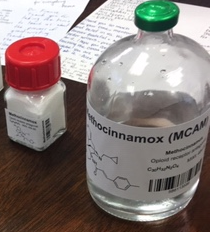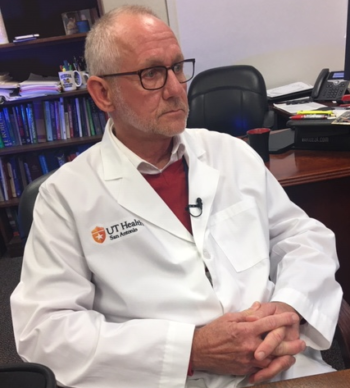Naloxone (brand name Narcan®) is used to rescue people from an opioid overdose, but the protection lasts an hour or less. Opioid effects can persist for several hours, however, and puts the individual at risk of an overdose re-emerging as naloxone wears off.
Researchers in the Long School of Medicine and with the University of Bath, U.K., are developing a long-lasting anti-opioid drug, called MCAM, to address this problem.

Their vision is to administer a single injection of the drug and protect against opioid overdose not just for hours, but for weeks or longer.
“This drug would have tremendous application for people who have a high risk of overdose,” said project leader Charles P. France, Ph.D., professor of pharmacology and psychiatry who occupies the Robert A. Welch Distinguished University Chair in the Long School of Medicine.
In published research, a single administration of MCAM blocked the effects of heroin and fentanyl in rodents and nonhuman primates for several weeks, Dr. France said.
The drug was discovered by University of Bath professors, John W. Lewis, Ph.D., and Stephen M. Husbands, Ph.D., who continue to perform medicinal chemistry to optimize its properties.
MCAM blocks the places in the brain where opioid drugs such as heroin and fentanyl attach and produce their effects.
Naloxone does this, too, but MCAM attaches much tighter, accounting for its very long duration of action, Dr. France said.
In addition to rescuing from overdose, MCAM could be used to treat opioid use disorder because it blocks the euphoria that contributes to abuse of opioids. Long-lasting relief from opioid addiction would be tremendously important, particularly in regions where physicians and especially addiction psychiatrists are in scarce supply.

“Much of the opioid crisis in the United States is occurring in rural America, where there is less access to health care,” Dr. France said. “You can imagine that being able to give a single injection of MCAM and protect someone from the addictive properties and adverse effects of opioids for months or longer could change many lives for the better.”
Twenty people in laboratories at the Long School of Medicine are working on MCAM.
“We recently received two grants from the National Institute on Drug Abuse, one of the National Institutes of Health, to investigate the basic science of this drug and work out the details in cells and animals,” Dr. France said. “We recently received another grant that will eventually help us get U.S. Food and Drug Administration approval to bring MCAM into phase I (first-in-human) clinical trials.”
The timeline to possible human trials is two years, Dr. France said.
“We have to get this right. There is an urgency,” he said.
Read the full news release.


